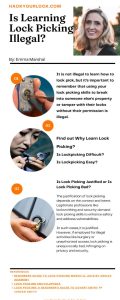Lock picking, often regarded as a captivating mechanical art, has garnered interest from hobbyists, security enthusiasts, and professionals alike.
In this exploration of the legal and ethical dimensions surrounding lock picking, we delve into the question: Is learning lockpicking illegal?
This article aims to shed light on learning to lockpick, its potential implications (if lock picking is justified or bad), why learn lock picking, and whether is it hard to learn lockpicking.

Contents
Is Learning Lock Picking Illegal?
It is not illegal to learn how to lock pick, but it’s important to remember that using your lock picking skills to break into someone else’s property or tamper with their locks without their permission is illegal.
If you’re interested in learning lock picking as a hobby or as a skill to help you understand how locks work, there are plenty of resources available to help you learn. However, it’s important to use your new knowledge ethically and responsibly.
Interest in Learning to Lock Pick
In the quiet corners of my grandfather’s attic, a hidden world awaited discovery. Amongst the forgotten relics, an assortment of locks and weathered tools beckoned to me.
This was the catalyst for my fascination with the art of lock picking and the beginning of my journey in learning to lock pick.
As I delved into the depths of this captivating skill, I found myself grappling with questions. Among them, is a persistent inquiry: Is learning lock picking illegal? This query added a layer of complexity to my pursuit, prompting me to navigate the intricate web of legality and ethics surrounding lock picking.
Through countless hours of research, from deciphering ancient wooden pin lock mechanisms to studying modern security systems, I honed my skills.
My learning of lock picking progressed from simple curiosity to a genuine passion. Alongside the practical knowledge, I absorbed the stories and wisdom shared by a diverse community of enthusiasts.
Interactions with locksmiths and security experts provided insights into responsible learning of lock picking. Their emphasis on ethical conduct and the responsible use of this knowledge echoed in my mind as I continued my journey.
It became clear that learning lock picking wasn’t just about acquiring a skill; it was about embracing a philosophy of mindful exploration.

My path in learning lock picking led me to appreciate the delicate balance between knowledge and responsibility. I marveled at the intricacies of each lock I picked, all the while being acutely aware of the ethical considerations.
The phrase “Is learning lock picking illegal?” resonated in my thoughts, a reminder that my newfound skill came with a responsibility to use it wisely.
My journey of learning lock picking wasn’t solely about mastering a craft; it was a profound exploration of the interplay between legality, ethics, and personal growth.
This adventure allowed me to unlock not only physical barriers but also a deeper understanding of the complex world we navigate, one pick at a time.
Is It Hard To Learn Lock Picking?
Learning the art of lock picking can be both intriguing and rewarding, but it comes with its own set of challenges. Aspiring lock pickers often wonder, “Is it hard to learn lock picking?”
The answer lies in a delicate balance of skill, practice, and understanding.
Learning how to pick locks can be a fascinating journey that blends skill with a touch of artistry. While it’s not an insurmountable task, it does come with its share of challenges that call for patience and dedication.
Becoming a master at maneuvering pins and tumblers requires a delicate touch and a thorough grasp of the mechanics involved.
How Hard Is It To Learn Lock Picking?
Lock picking is a skill that requires finesse and patience. As beginners embark on their journey, they encounter a learning curve. Understanding the inner workings of locks and developing a feel for each pin’s movement demand dedication.
The question of “How hard is it to learn lock picking?” is closely linked to the commitment one invests.
Overcoming initial hurdles, such as differentiating binding pins from set pins, is part of the process. Tension, a crucial element, requires a nuanced touch.
While challenges exist, the path to learning lock picking is illuminated by the satisfaction of gradual improvement. With time, the once daunting task becomes an accessible skill set.
So, is it hard to learn lock picking? Like any craft, it demands effort, but the journey itself holds its invaluable rewards.
Is It Illegal to Learn How to Pick a Lock?
The question of whether it’s illegal to learn how to pick a lock is one that often sparks curiosity and concern. Learning how to pick a lock is not inherently illegal in most jurisdictions.
Many enthusiasts and professionals, such as locksmiths and security experts, study lock picking to better understand security systems and enhance their skills.
Is Learning Lockpicking Illegal Activity
No, learning lock picking is not an illegal activity. Legality comes into play when intent and context are considered. If the knowledge and techniques of lock picking are acquired to engage in criminal activities, then it certainly becomes illegal.
Possessing lock picking tools with the intent to use them for unlawful purposes is generally against the law.
In essence, the act of learning how to pick a lock itself is not illegal, but the ethical and legal boundaries lie in how that knowledge is used. Responsible learning, ethical considerations, and a commitment to using acquired skills for lawful and constructive purposes are vital aspects of navigating the legal landscape surrounding lock picking.
Is Learning Lock Picking Illegal Anywhere In the World
In many countries, lock picking tools and techniques are legal to possess and use for lawful purposes, such as locksmithing, security testing, or personal hobby and education. However, there are also countries where owning and using lock picking tools can be considered illegal or regulated under certain conditions.
For example, in the United States, lock picking is generally legal, but some states have specific laws that regulate the possession and use of lock picking tools.
Similarly, in the United Kingdom, it is legal to possess lock picking tools, but using them to commit a crime can result in prosecution for burglary or other offenses.
In other countries, such as Canada, Australia, and Germany, the laws on lock picking vary and may be subject to interpretation by law enforcement and courts.
In some countries, such as Japan, lock-picking tools are illegal for most people to possess, but in many others, they are available and legal to own as long as there is no intent to use them for criminal purposes.
Is Learning Lockpicking Illegal for Minors
There is no specific mention of age restrictions for learning lock picking. However, it is always a good idea to check with your local laws and regulations to ensure that you are not breaking any laws.
Why Learn Lock Picking
Learning lock picking offers a unique blend of practicality and intrigue, making it an enticing skill for various individuals. For locksmiths and security professionals, mastering lock picking techniques enhances their ability to understand and address security vulnerabilities.
It provides insights into the mechanisms of locks, aiding in the design of more robust systems. Moreover, understanding lock picking can empower individuals to make informed choices when selecting locks for their homes or businesses, contributing to overall safety.
Lock Picking Encyclopedia is a good place to learn relevant and basic lock picking knowledge
Is Lockpicking Difficult?
Lock picking is a skill that demands patience, precision, and practice. While it might appear straightforward in concept, it requires a keen sense of touch and a thorough understanding of lock mechanics.
The process involves manipulating delicate components within a lock to achieve proper alignment, a task that can be challenging for beginners. Developing the necessary finesse and tactile sensitivity takes time, and proficiency comes with consistent effort and learning.
Is Lockpicking Easy?
Conversely, some might find lock picking accessible, especially when approaching it with the right mindset and guidance. Simple locks can be relatively easy to pick, and with proper instruction and practice, beginners can grasp the foundational techniques.
However, as the complexity of locks increases, so does the level of difficulty. Aspiring lock pickers should keep in mind that while entry-level locks might be easy to conquer, more advanced systems can present significant challenges that require continuous improvement and dedication.
Learning lock picking offers valuable insights for security professionals and individuals concerned with safety. While not necessarily easy, lock picking is a skill that can be acquired through dedication and consistent practice. Its level of difficulty varies with the complexity of locks, making it a journey that rewards both patience and persistence.
Is Lock Picking Justified or Is Lock Picking Bad?
The justification of lock picking depends on the context and intent. Legitimate professions like locksmithing and security demand lock picking skills to enhance safety and address vulnerabilities. In such cases, it is justified.
However, if employed for illegal activities like burglary or unauthorized access, lock picking is unequivocally bad, infringing on privacy and security. The ethical stance on lock picking hinges on responsible and lawful use, emphasizing the importance of discernment and integrity in its practice.
Lock Picking: A Beginner’s Guide to Covert Entry is a justified place to know more.
Conclusion
In the intricate world of lock picking, the question “Is learning lock picking illegal?” transcends a simple yes or no. It underscores the importance of intention, context, and responsible use. While the act of learning lock picking itself is not inherently illegal, its ethical implications are tightly intertwined with how the acquired knowledge is wielded.
Lock picking serves as a double-edged skill, capable of enhancing security when employed responsibly by professionals, or compromising it when misused for illicit purposes.
The key lies in fostering a sense of responsibility, understanding the legal boundaries, and promoting ethical discussions within the lock picking community.
As with any skill, the line between legality and criminality is defined by the choices we make, emphasizing the significance of a thoughtful and principled approach to learning and practicing lock picking.
FAQ’s
Is it against the law to learn how to pick locks?
Learning how to pick locks, itself, is generally not illegal. However, the legality depends on the intent and use of the acquired skills. Using lock picking knowledge for criminal activities, such as burglary or theft, is illegal in most jurisdictions.
Can I legally practice lock picking as a hobby?
Engaging in lock picking as a hobby is typically legal as long as it’s done responsibly and within the boundaries of the law. Many enthusiasts explore lock picking for educational purposes or to gain a better understanding of security systems.
Are there any restrictions on owning lock picking tools?
The possession of lock picking tools can be regulated in some places. While many jurisdictions allow ownership for educational or professional purposes, possessing such tools with the intent to commit crimes can lead to legal consequences. It’s essential to familiarize yourself with local laws regarding the possession and use of lock picking tools.
